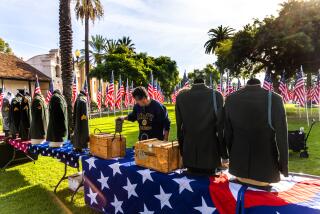70 years of sifting through military surplus
For years, one of the most top-secret weapons of World War II sat in a corner of Jerome Oxman’s shop, past the stacks of neatly folded fatigues, the rows of olive-drab canteens and a display of combat boots.
The Norden bombsight, a gyroscopically controlled telescope and computer that allowed the U.S. Army Air Forces to zero in on Axis ground targets, was as expensive as it was sophisticated: Each device cost about $122,400 in today’s dollars.
Oxman bought his for $9.80. He picked it up when his employer, a Vernon surplus store, sent him to collect a load of government gear in 1950.
The retired bombsight was the first artifact in a vast collection of unusual military castoffs that Oxman would accumulate over 70 years.
By the time he opened his own surplus business in Santa Fe Springs in 1961, Oxman had purchased hundreds of specialized military items at government auction — items that no one else seemed interested in owning. When he found himself always explaining to customers the purpose of equipment scattered around his shop, he decided to open his own military museum.
Now, with Oxman preparing to celebrate his 96th birthday, the museum still draws war buffs and the curious alike.
Near the entrance is an actual B-17 bomber cockpit that visitors are encouraged to crawl into. Oxman bought it in 1963 for $100 from an archeological team that discovered it buried for decades in the sands of the Sahara Desert.
Along one wall is a sprawling collection of inert World War II bombs and artillery shells. Along another are World War II newspaper front pages and a display case containing a 1940s landmine, a pair of “minefield walking shoes” that were supposed to protect foot soldiers and a 75-year-old funnel-like “fighter pilot relief tube.”
Nearby is an original case stamped “Librascope Balance Computor” that B-17 pilots used to calculate weight distribution in their aircraft. There’s also a 2,800-pound Vietnam War-era Bullpup air-to-ground guided missile, which flew at Mach-1.8.
“I paid $300 for that in 1969,” Oxman said, rapping his knuckle on the side of the 14-foot missile.
Among the 1,580 items displayed in the museum are a wartime German Mauser pistol and a 20-millimeter anti-tank gun. An 1862 Norwegian whaling harpoon stands near a small dining area Oxman calls the “Mess Tent Cafe.” The menu includes actual military MRE field rations.
There are fighter jet ejector seats that visitors can sit in and a heat-seeking missile whose tip can be unscrewed to show the actual heat sensor.
“Look at how lightweight this is. It’s some sort of composite metal,” said Filipe Cortes, a 34-year-old Whittier musician who was accompanied by neighbor Terry Kestler, 54. “I’m seeing things here I never thought I’d see.”
The recently enlarged museum, which is free to the public, operates in conjunction with Oxman’s surplus store at 14128 E. Rosecrans Ave. The shop is operated by Oxman, his wife of 63 years, Miriam, and his sons Murray, 61, and Jason, 49. A third son, Brian, 59, is a defense attorney whose clients have included Michael Jackson.
The family stages occasional special events at the museum, such as the recent “Lunch with a Hero.” The Saturday gathering featured World War II D-Day paratrooper-medic Edwin Pepping, 88, of Whittier.
Miriam Oxman said she enjoys the military collection as much as her husband does.
Pointing to a parabolic mirror from a World War II signaling device, she recounted how a customer once placed her handbag in front of the curved glass.
“We weren’t paying attention, and the sun was hitting it just right, and it set her purse on fire,” she said.
Oxman said his museum pieces are not for sale, even though private collectors often beg him to part with items. He said he once sold four surplus B-29 engines and propellers from a group of eight he purchased in 1964 for $400. He sold the engines to a private group that was restoring a bomber that had crash-landed in Greenland in 1947.
The 1995 salvage attempt of the Superfortress spy plane called the Kee Bird failed, however.
“After they had repaired it and were taking off, it caught fire and was destroyed,” Oxman said. “I’ve got one B-29 engine here on display. I sure wish I had one of those propellers back.”
Oxman’s family said they plan to commemorate his 96th birthday with special museum tours conducted by him personally on June 25.
During the tours, Oxman will describe how the Space Shuttle servo activator he has on display heats its wing controls and how he came to acquire the $187,000 device “with a lot of other stuff” for $235.
He will talk about the Norden Bombsight too.
“It was so secret it was set up with explosives to blow up if the plane was shot down or captured,” he said.
And Oxman — who first became fascinated with military equipment while serving three years on a U.S. Army supply route in Iran during World War II — will explain how the surplus business has changed in his lifetime.
“There used to be so much surplus equipment stored by aircraft companies and military bases all over the country,” he said. “Now, it’s hard to find.”
More to Read
Sign up for Essential California
The most important California stories and recommendations in your inbox every morning.
You may occasionally receive promotional content from the Los Angeles Times.











